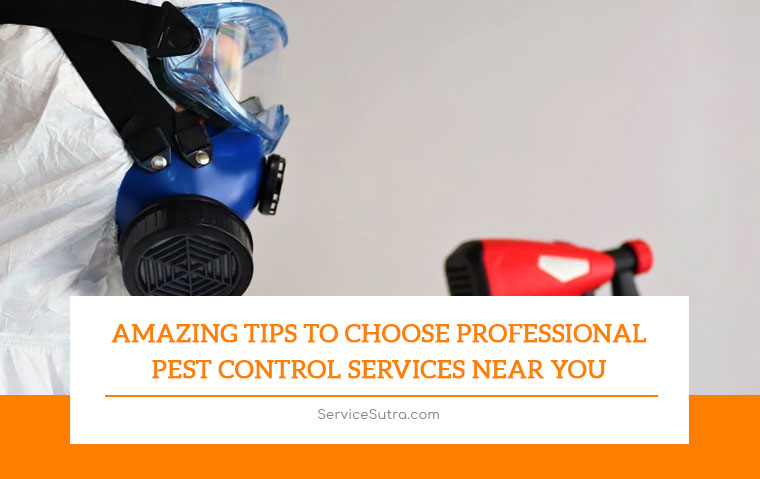Pest Control Clovis Experts: Protecting Your Family and Home
Wiki Article
Recognizing the Different Strategies to Insect Control: A Comprehensive Overview

Natural Bug Control Techniques
Using environment-friendly methods such as buddy growing and biological insect control is necessary for successfully taking care of insects in agricultural settings. Companion planting entails expanding various crops in distance to discourage parasites, boost nutrient uptake, and enhance general crop health. As an example, growing marigolds along with tomatoes can assist drive away nematodes. Similarly, intercropping maize with legumes can interfere with the reproduction patterns of insects like corn borers.Organic parasite control includes presenting natural killers or microorganisms to regulate pest populations. Ladybugs, for example, feed upon aphids, managing their numbers without the need for chemical pesticides. An additional example is making use of Bacillus thuringiensis (Bt), a bacterium that targets certain insect pests while being safe to humans, animals, and beneficial bugs.
These eco-friendly techniques not just decrease the dependence on synthetic pesticides yet additionally help maintain biodiversity and dirt health. By including natural insect control approaches into agricultural practices, farmers can accomplish sustainable parasite management while lessening adverse influence on the atmosphere.

Chemical Bug Control Solutions
Along with all-natural pest control methods, the use of chemical bug control remedies plays a substantial duty in effectively managing pest populations in agricultural atmospheres. Chemical bug control options are created to target details parasites that may cause substantial damages to plants. These remedies often contain synthetic chemicals that are designed to eradicate pests quickly and efficiently.Among the vital benefits of chemical parasite control remedies is their efficiency in controlling pest infestations on a large range. Farmers can use these options utilizing various methods such as splashing, fumigation, or seed treatment to shield their plants from dangerous bugs, weeds, and illness. Additionally, chemical parasite control remedies are fairly easy to apply and can provide quick outcomes, assisting farmers safeguard their returns and lessen economic losses.
Nevertheless, it is essential to use chemical parasite control options judiciously to decrease potential adverse impacts on the setting, non-target organisms, and human health and wellness. Proper application methods, adherence to safety and security guidelines, and normal monitoring are critical to guarantee the liable use chemical bug control solutions in agricultural techniques.
Organic Pest Control Approaches
Biological parasite control approaches leverage natural predators or microorganisms to handle bug populaces in farming setups successfully. One usual organic control approach is the intro of natural adversaries, such as ladybugs or parasitic wasps, to target specific pests.Another organic control method entails making use of virus like fungis, bacteria, or infections to infect and eliminate pests. Generally, biological pest control techniques provide a lasting and targeted service to pest monitoring in agriculture.
Integrated Bug Monitoring (IPM)
Integrated Bug Monitoring (IPM) is an extensive strategy that incorporates different bug control strategies to successfully take care of and minimize pest populations in farming systems. IPM concentrates on long-term prevention of insects via a mix of biological, cultural, physical, and chemical control techniques. By incorporating these various approaches, IPM aims to minimize dependence on chemical pesticides, decrease ecological influence, and advertise sustainable insect administration techniques.
One trick facet of IPM is the use of biological controls such as natural predators, bloodsuckers, and pathogens to regulate insect populations. This technique takes advantage of the power of nature to keep an equilibrium in between pests and their natural enemies without causing damage to the setting.
In addition, check these guys out IPM entails social techniques like plant sanitation, turning, and environment control to produce undesirable conditions for pests and disrupt their life process. Physical controls such as barriers, traps, and composts are likewise utilized to stop pest infestations.
Mechanical and Physical Parasite Control Strategies
Using non-chemical methods, such as mechanical and physical parasite control techniques, is a vital element of extensive pest monitoring methods, developing upon the structure of Integrated Bug Administration's holistic technique. Mechanical pest control entails making use of physical obstacles or catches to prevent parasites from accessing and damaging plants or frameworks. This method can consist of techniques like installing displays on windows, making use of row covers in agriculture, or using sticky traps to capture bugs.Physical parasite control techniques, on the various other hand, concentrate on straight eliminating parasites with physical means. Using warmth treatments to eliminate bed pests or vacuuming up insects like crawlers or ants can be reliable ways to take care of infestations without the use of chemicals. By integrating these physical and mechanical pest control methods right into an Integrated Pest Administration plan, specialists and individuals can decrease dependence on chemicals while still efficiently handling pest populaces and minimizing damages.
Final Thought

In addition to all-natural insect control approaches, the use of chemical insect control remedies plays a considerable role in properly taking care of pest populaces in farming environments.One of the vital benefits of chemical pest control services is their effectiveness in regulating insect problems on a big scale.Integrated Bug Management (IPM) is a thorough method that incorporates various bug control strategies to successfully manage and lessen pest populaces this link in agricultural systems.Utilizing non-chemical methods, such as physical and mechanical pest control methods, is an essential facet of comprehensive insect monitoring strategies, developing upon the structure of Integrated Pest Management's holistic technique. By including these mechanical and physical insect control methods right into an Integrated Pest Management plan, professionals and individuals can decrease reliance on pesticides anonymous while still successfully taking care of pest populaces and minimizing damages.
Report this wiki page